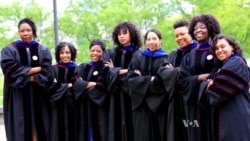The numbers are impressive and show a rapidly changing world. Since 2008, more women than men have been earning doctoral degrees, and the percentage has continued to increase over the years.
Black women are no exception, but according to the website blackwomenphd.org, they make up less than five percent of the total Ph.D. population in the United States
That's part of what makes the eight African-American women who will earn their Ph.D.s in education this summer from Indiana University so special. For them, this graduation is a small victory and the credit goes to their support group, called Sister Circle.
The women’s reasons for pursuing doctorate degrees vary. As children, Nadrea Njoku and Johari Shuck watched their mothers earn college degrees, while Tiffany Kyser and Jada Phelps-Moultrie saw inequities while teaching that they wanted to address. No matter their motivation, Phelps-Moultrie says they are grateful to Sister Circle, aimed at women of color.
"It was refreshing, I would say, to have other people that look like you," she told VOA. "Particularly when I was in a bachelor's and master's program where I was the only one."
Sister Circle was born of a Facebook post, asking if there were any female minority students attending Indiana University-Purdue University Indianapolis pursuing advanced degrees.
‘Isolation, solitude’
The eight women had met each other here and there before the group cemented their friendship and helped them toward their goal. Jasmine Haywood says it was a great place to vent frustrations, offer help, and cheer each other on.
"It helps the take away the feelings of isolation and solitude," Haywood said. "No matter who you are, getting a Ph.D. can be a lonely process. Then add layers of woman of color, mother, wife — it can become that much more isolating."
In addition to meeting in person, the group offered a lot of online support — from posting announcements about helpful educational opportunities, to sharing encouragement. On many occasions, it facilitated one-on-one assistance, like watching each other's children or helping those — like Shuck — who live several hours away.
"We've all had each others' backs," she said. "I've been here in Chicago, but I still have business in Indiana, so needing things being signed, helping paperwork get around, I've relied on Jasmine to do that.”
Instead of the typical two or three education doctoral students of color, this year there are 10 — the Sister Circle women and two men. University officials attribute that to a larger class than usual, a flexible admissions policy, and — as professor Robin Hughes points out— a special emphasis on recruiting minority students.
"I'm hoping that this is a trend not only at this institution but at all institutions," Hughes said, "and that it won't be a big deal that we're graduating folks of color. That will be the norm."
‘Transformed’
Hughes, the adviser for many of the women in the Sister Circle, says the key is to make sure schools don't just claim to embrace diversity, but take proactive measures such as hiring a diverse staff to attract students of color.
Kyser, who plans to use her degree to help schools address racial inequities within their systems, says those proactive measures should start early — from preschool on — and focus on ensuring physical, emotional, cultural and intellectual safety in the classroom.
"All students should feel free to take intellectual risks," Kyser said. "They should be supported in their learning and growth through a safe and inclusive framework."
Njoku joined the doctoral program after her hometown of New Orleans was devastated by Hurricane Katrina. Watching her single mother attend college is what sparked her desire to attend graduate school. She says the storm re-emphasized how important it was to get a higher degree, especially for people of color.
"I just saw our life transformed in ways that I had never imagined it would," Njoku said. "Like I saw her transform as a college student in general, but then when she received her degree, the amount of financial independence that we received!”
The women hope to keep Sister Circle going long after they go their separate ways. They plan to hand it off to a new generation of students over the summer. If they have one piece of advice for anyone attending college at any level, it's to have a great support network of family and friends in place. It can make all the difference.





